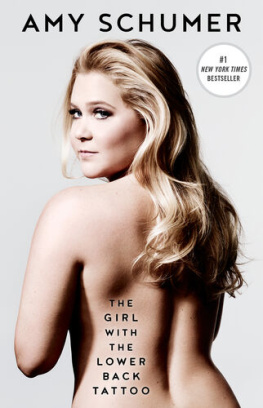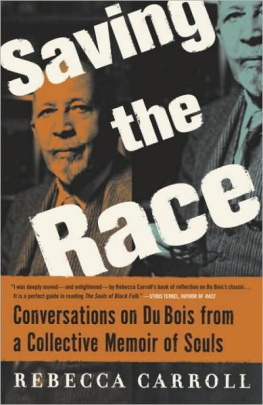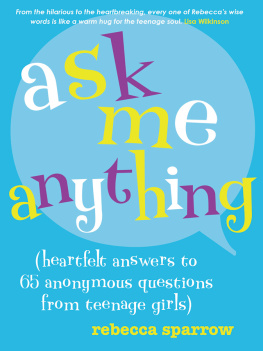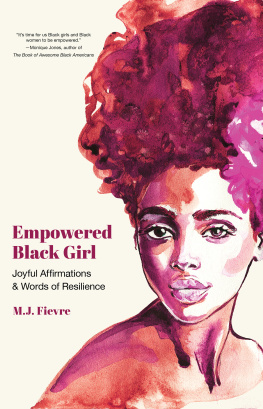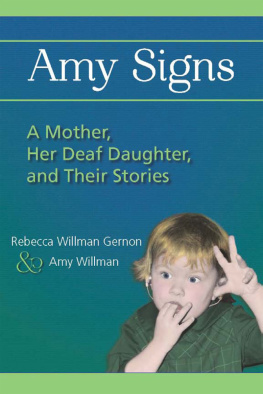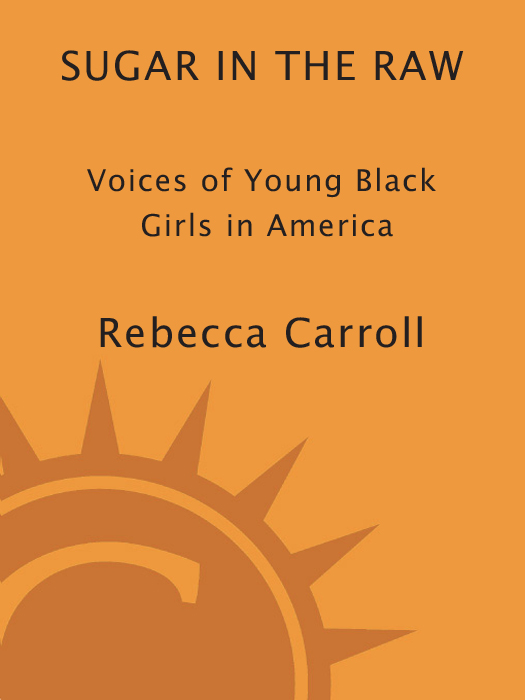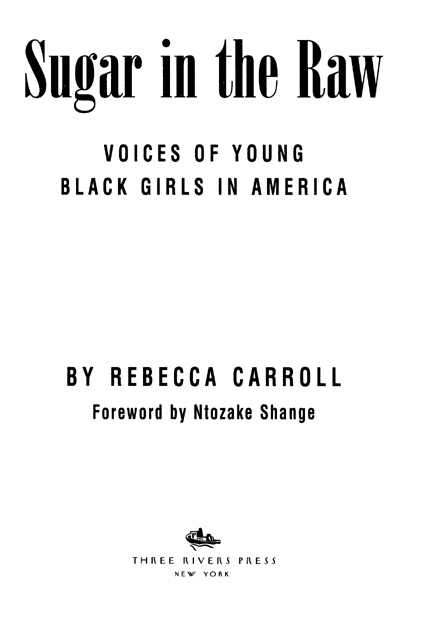Copyright 1997 by Rebecca Carroll
All rights reserved. No part of this book may be reproduced or transmitted in any form or by any means, electronic or mechanical, including photocopying, recording, or by any information storage and retrieval system, without permission in writing from the publisher.
Published by Three Rivers Press, New York, New York 10022.
Member of the Crown Publishing Group,
a division of Random House, Inc.
www.randomhouse.com
THREE RIVERS PRESS and the Tugboat design
are registered trademarks of Random House, Inc.
Library of Congress Cataloging-in-Publication Data
is available upon request.
eISBN: 978-0-307-56041-4
v3.1
This book is for my mom, Laurette Carroll, who
raised a black girlchild in America on sheer conviction
and fierce motherlove.
And to my dad, David Carroll, who introduced me to
journal writing and bade me never to forsake it.
Contents
ACKNOWLEDGMENTS
I would like to thank the following foundations, institutions, schools, and remarkable individuals for their invaluable support:
The W. K. Kellogg Foundation; The W.E.B. Du Bois Institute for Afro-American Research at Harvard University; The Altamont School of Birmingham, Alabama; The Birmingham School of Fine Arts; the Urban League of Portland, Oregon; the Urban School of San Francisco, California; St. Francis of Assisi School in Brooklyn, New York; the Urban League of Springfield, Massachusetts; the Office of Equal Employment for Albuquerque, New Mexico, Public Schools; The Boys and Girls Club of Burlington, Vermont; and my editor, Eliza Scott.
John Wilson, Henry Louis Gates, Jr., Peter Glenshaw, and Sherry Lovelace, for both their individual and collective faith; Charles and Patricia Gaines, for their warmth and guidance; my older brother, Sean, and older sister, Riana, for having always been my guardian angels; Rebecca T. Emeny, for her guileless wisdom; Laura Donovan, for her continued support and brilliant sense of humor; Leah Giberson, for lifelong friendship and love; my students at NCDS, for genuinely embracing me as their teacher and then some; and Monique Cormier, still and always.
And to all of the girls who participated in this project, your voices are the future how lucky we are for that.
FOREWORD
As I read and read again Rebecca Carrolls Sugar in the Raw, I eagerly recounted sense memories of my teen years. Yet, I must honestly admit, sometimes I forced myself to relive with these young black women moments that continue to sicken me, inhibit and constrain my spirit. I think the most frequent and long-lived aspects of being colored, a woman, and alive is that our presence is still a surprise, an anomaly. Our mere presence, mind you, turns heads. What an inhospitable arena to reconnoiter, negotiate, find faith that indeed the sun does rise, if our very existence is not believable.
As both my grandmothers would say were they with us today (and I must insist that through me they are here), the Lord wouldnt set nothing upon us that we couldnt handle. Yet this passel of young girls essentially echoes my grandmothers axiom on their own. One by one they conjure a sense of wonder and strength, and play with not one nevermind if we know or care who or where they arefrom Jaminica in San Francisco, whose third-grade ballet teacher attempted to squash the childs love of movement and her backside by ignoring her mercilessly, to Tiffany in Alabama, who knows to have close white friends but not real close ones, just as she realizes the custodians in her school are not our only role models. (But they do work hard.)
I would be less than candid to suggest that I had in any way wrestled with these issues successfully before my early twenties. Yet, Lanika, seventeen, is aeons ahead of my generations ambivalence toward white rock n rollers like the ones we saw daily on The Dick Clark Show:
Now let me tell you a couple of things: First, having dreadlocks doesnt make you black, wearing your pants baggy doesnt make you black, talking a certain way doesnt make you black. Its insulting because it reduces the black experience down to products or, at the very most, dialect.
An openness to alternatives is apparent among these interesting and thoughtful girls as well. I remember distinctly that some professions or vocations were to be sought or refused depending on how many of the race they employed and what status they afforded the race. The race had no art historians who had mortgages that we knew of, therefore art history (even of our history) was not a good career choice. On the other hand, black people die, so doctors, undertakers, and insurance sales were good. These young women have a grounded sense of race, but their race consciousness is not restrictive in any sense. Listen to Alaza of Portland, Oregon:
If I ever did go to college, it would be for cosmetology school because I want to learn how to put makeup on dead people. I would like to be the person who makes dead people look cute. Ive been to a lot of funerals and the dead people always look so bad. They never look like themselves; theyre all gray and everything. And Id be thinking, You know, they coulda done their hair different, too. Ive lost a lot of friends. And, like I said, I lost my brother. I think when you leave this world, you oughta be looking cute.
At one fell swoop the myth of the sex-crazed hip-hop girls smashes into a thousand tears of the caring sisters, homes, and girlfriends whove already lost so much of each other: They go to a lot of funerals. But, hey, they want to make sure none of us thinks shes been beaten down, not even when dreams like Aishas of Seattle wait teeter-tottering on droughts and class warfare in Brazil:
I wanted to build my own house in Brazil on the bank of a river. Id want my house by a river because I like water so much. Its so gentle and lyrical.
Recognizing in themselves a vitality and legitimacy I know for a fact were yearned and fought for by their forebears, the narrators belie hopelessness, cynicism, and gross navet. Eschewing the legacy of Morrisons The Bluest Eye, Latisha, Myesha, Reni, and all the others are able to cradle our vulnerabilities as they build on strengths needed to confront and enrich the next millennium. As Alaza says: I remember saying, Yeah, girl. Its good to be black. And it is.
A grown black woman, I, Ntozake, want to make witness of the backbone, clarity, and fragile, agile spirits these young girls and women have chosen to share with the world. Yes, they no longer obsess about shining floors, or where to sit on the bus, or why a poll tax test was failed again. Their energies are world-class, their focus global, their selves glistening in a beauty usually only mothers notice.
BEHOLD! Our Daughters!
Ntozake Shange
2 Septiembre 1995
Filadelfia
INTRODUCTION
In the fall of my first year teaching, I had a conversation about colleges and various black girlchild issues with a student of mine, a senior. A little way into our conversation, my student looked at me with a somewhat forlorn expression and said with a sigh, I wish you had been here when I was a freshman. As a freshman, this student had been one of the first of a handful of black students to attend the private Catholic school where I now teach. Although I had been teaching for only four months at the time, in response to my students comment I immediately felt an eerie sense of familiarity, and of identity struggle, impasse, and melancholy.


